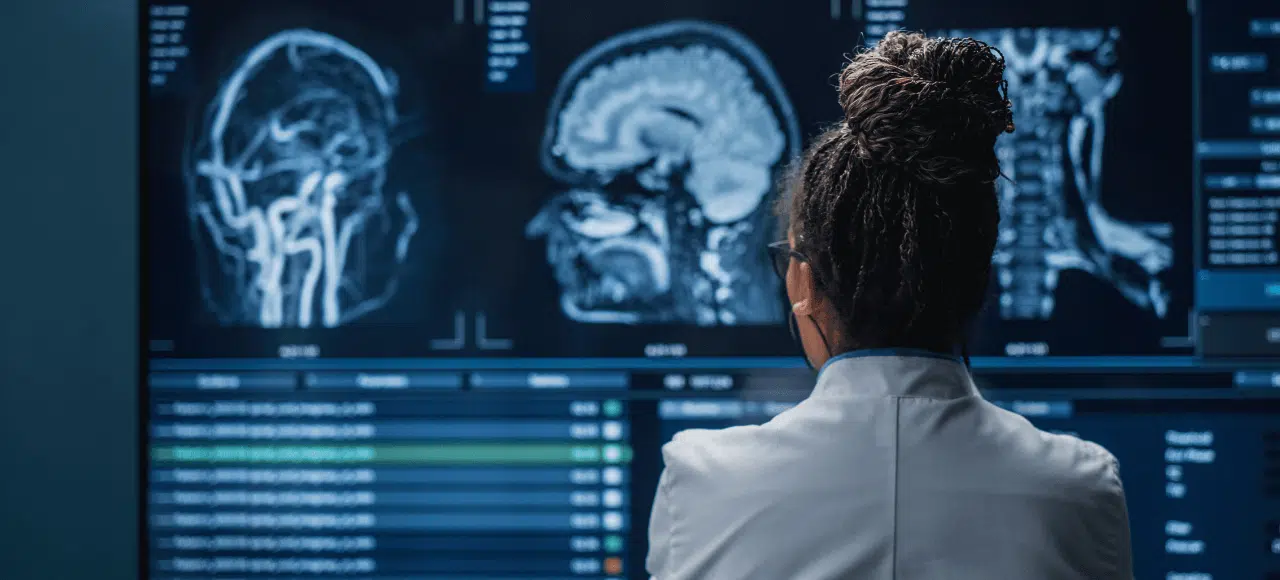Private memory clinic in London
Realise your cognitive potential
At Dementech Neurosciences, our team of specialist neurologists help patients realise their full cognitive potential by using advanced healthcare solutions to diagnose and treat working memory problems.

What Is a Private Memory Clinic?
A private memory clinic is a clinic that specialises in providing expert-led memory assessments, imaging and diagnostic techniques to help treat a wide variety of memory-related conditions.
Through the expertise of a team of highly qualified neurologists, psychologists and occupational therapists, private memory clinics offer comprehensive care to patients, tailored to suit each individual’s needs and requirements.
Dementech Neurosciences is a leading private memory clinic in London.
Do I Have a Memory Problem?
Memory lapses like occasional forgetfulness or misplaced items, are all part of human nature and, on their own, don’t necessarily indicate a significant memory problem.
This is because factors such as inattention, information overload or mild depression can all temporarily impair our memory function.
It’s only when these memory lapses start to noticeably interfere with your daily life that it may be worth seeing a specialist.
Which neurological conditions are related to memory problems?
While it’s common to experience mild memory loss with age, there are several factors, circumstances and medical conditions that can exacerbate memory issues.
Certain neurological conditions are related to memory problems. These conditions may all manifest differently from one another, but they are all often associated with memory loss.
Some of the main examples include:
Alzheimer’s disease: The most common cause of dementia, Alzheimer’s disease causes a gradual deterioration of brain cells which, over time, can lead to memory loss, cognitive decline and altered behaviour.
Lewy body dementia: Lewy body dementia is a progressive condition associated with the build-up of abnormal protein deposits in the brain, causing reduced cognitive ability, visual hallucinations and movement disorders.
Vascular dementia: another common form of dementia, vascular dementia is caused by problems with the supply of blood to the brain and can be brought on after having a stroke.
Frontotemporal dementia: this neurodegenerative disorder is characterised by progressive damage to the frontal and temporal lobes of the brain, leading to changes in behaviour, personality and language abilities.
Parkinson’s disease dementia: this refers to cognitive decline and memory problems that occur as a complication of Parkinson’s disease, a progressive neurological disorder which primarily affects movement.
Mild Cognitive Impairment (MCI): patients with MCI do not meet the criteria for dementia but may experience a noticeable cognitive decline beyond what is expected for their age, leading to impaired thinking, memory or judgment.
Other progressive neurodegenerative diseases, like Huntington’s disease and multiple sclerosis, and mental health disorders, like post-traumatic stress disorder, can also impact your memory.
At Dementech Neurosciences, our team can assess and diagnose all these conditions and more, helping develop personalised treatment plans to specifically combat the cause of your memory-related symptoms.
Recognising the symptoms of memory problems
Memory symptoms can significantly impact your ability to perform day-to-day tasks and impact your overall quality of life. They can also appear in different ways, including:
Forgetting recent events, appointments or important details on a regular basis.
Struggling to acquire new information or skills, despite repeated efforts.
Feeling disoriented or getting lost in familiar surroundings, leading to anxiety or frustration.
Difficulty finding words, expressing thoughts coherently or being able to keep up with conversations.
Making poor decisions or exhibiting impaired reasoning skills in everyday situations.
Frequently losing or misplacing your belongings in unusual locations and having difficulty retracing your steps to find them again.
Displaying different types of moods – from increased irritability to depression – often without any apparent cause.
Choosing to avoid social interactions and becoming less engaged in hobbies or activities once enjoyed, due to memory-related challenges.
It’s important to note that these symptoms may indicate that there is an underlying condition affecting your memory. Getting a comprehensive assessment with a qualified neurology specialist will help determine the cause and establish the next steps.
What to expect during a private memory assessment
At Dementech Neurosciences, we understand the huge impact that memory difficulties can have. That’s why our diagnosis and treatment processes have been designed to not only prioritise accessibility and accuracy but also harness the experience of our neurologists.
Our goal is to uncover the cause behind your memory problems and provide comprehensive care to improve your quality of life.
We do this by using a range of advanced imaging techniques, including MRI scans, neurological evaluations and cognitive tests, to deliver an accurate assessment. From these results, we can accurately diagnose the issue and put you on an appropriate treatment plan to help manage any symptoms you are currently experiencing.
Why choose us for memory clinic services?
As the leading private memory clinic in London, our team are dedicated to providing all patients with the comfort, confidentiality and personalised attention they deserve.
Through our commitment to clinical excellence, we can also employ the latest evidence-based therapies in our treatment plans, helping ensure you have access to only the very best treatment options.
Here are some of the other benefits you can expect:
Gain expedited access to our renowned experts with prompt appointments available whenever suits you. We understand the importance of timely care and ensure that your concerns are addressed without unnecessary delay.
By conducting comprehensive memory assessments and diagnostic tests during your initial consultation, we can quickly uncover any underlying factors contributing to your memory problems.
Following your initial assessment, our team of neurologists will develop a detailed treatment and management plan for you, offering various potential medication and lifestyle recommendations.
Our patient advisors are always on hand to listen to your concerns and help find the best pathway around your specific needs. Through their expertise and guidance, we aim to empower you to make more informed decisions.
If you are unable to visit our London clinic in person, we can offer video consultations to deliver expert guidance and care from the comfort of your home environment.
Book A Consultation
MEET OUR TEAM:
Dr. Lucio D'Anna
World-class private memory clinicians
Our London-based clinic is home to a distinguished team of doctors and private neurologists, renowned globally for their exceptional expertise and commitment to clinical research.

Schedule a private dementia assessment in London
If you have recently found yourself struggling with memory issues, our team can help. Through our state-of-the-art diagnostic tools and access to the latest clinically-backed treatments, we can quickly identify the root cause and help address your symptoms.
Take control of your health journey and schedule your consultation today.
Visit our private London clinic in Wimpole Street:
Lister House
11 Wimpole street
W1G 9ST London
United Kingdom
Private memory clinic FAQs
If you have a question related to our private memory clinic, or about any memory-related issue you feel you may be experiencing, please browse our FAQ section below.
Our memory clinic offers a comprehensive range of services to address memory-related concerns. We provide diagnostic assessments, cognitive tests, advanced brain scans, and personalised therapies such as occupational therapy and music therapy. Our team of experienced neurologists and occupational therapists collaborate to deliver exceptional care and tailor treatment plans to each patient’s unique needs.
Scheduling an appointment at our clinic is convenient and straightforward. Just complete the contact form on our website, providing your details, and our dedicated team will promptly assist you. We prioritise prompt care and strive to accommodate same-day consultations whenever possible, ensuring timely access to our expert clinicians.
Absolutely. Our highly skilled team of neurologists specialises in the diagnosis and treatment of memory-related conditions. With extensive expertise in cognitive disorders and neurodegenerative diseases, they employ the latest diagnostic tools, conduct thorough evaluations, and create personalised treatment plans to support our patients’ cognitive well-being.
At our clinic, we offer a comprehensive range of state-of-the-art diagnostic tests and assessments to evaluate memory concerns effectively. These include MRI scans to examine brain structure, cognitive tests to assess cognitive function, and specialised brain scans to identify any abnormalities. Our experienced neurologists leverage these tools to provide accurate diagnoses and inform personalised treatment plans.
Protecting patient privacy and ensuring confidentiality are paramount to us. We strictly adhere to all confidentiality and data protection regulations, safeguarding patient records and personal information. Rest assured that your information is handled with the utmost care, maintaining the highest standards of privacy and security to preserve your confidentiality and peace of mind.
Yes, we provide a range of specialised therapies to address memory problems. Our dedicated occupational therapists offer personalised occupational therapy, utilising evidence-based techniques to improve cognitive function and daily functioning. Additionally, music therapy is available, harnessing the power of music to stimulate memory and enhance overall well-being.
Our services are primarily offered on a private basis. However, some treatments and consultations may be covered by private health insurance plans. We recommend contacting your insurance provider to determine the extent of coverage for our services, ensuring you have the necessary information to make informed decisions about your healthcare.
Patient Success Stories
Dementech Neurosciences prides itself on delivering exceptional patient care. Here are just some of our patient testimonials.

P Allen

“My family and I experienced one of the hardest times of our lives having to deal with my wife’s deteriorating condition. I would like to personally thank the lovely young lady Zobiaa from Dementech, for showering us with compassion, empathy and genuine care and concern. Her professionalism, high-level customer service and communication, eye for detail, and willingness to go the extra mile to accommodate our needs and make not only my wife, but our whole family, feel as comfortable and supported as possible, is something we will always be grateful for. Thank you so much for your friendly and polite presence Zobiaa and taking the time and effort to build a relationship with us. You really made our visits to the clinic a positive, 5 star experience.”

Anonymous

“Dementech Neurosciences is a relatively new clinic specialising in the scientific assessment and treatment of Parkinson’s Disease. It represents a significant development in the treatment of Parkinson’s and has done a great job of establishing itself and its reputation in a short period of time. The premises are extremely well situated in central London, the consultant neurologists are all at the top of their field in their specialisation of the treatment of Parkinson’s Disease, and the clinical and administrative staff are of a similar standard. The atmosphere of the clinic is positive and the results, in the short period of time I have been able to assess, have been similarly positive.”

N Mohammed

“Have had nothing but kindness and professionalism from Dementech and all their staff. From their initial guidance by Shakeela, through to staff conducting the MRI tests and Dr. Lucio D’Anna for his expertise clarity of explanation, compassion and consideration. Special mention to Zobia, who saved the day with her quick thinking that helped my mother-in-law to obtain extended care. Overall a perfect experience. Cannot recommend them enough.”
Latest blog posts & guides
5th November 2024
What Support is Available for Dementia Carers in the UK: Getting Help As A Carer
If you are caring for someone with Dementia in the UK, it is important to know what support is available,...
5th November 2024
Understanding Key Differences Between ADHD & Autism Spectrum Disorder: Diagnosing & Treating Two Of The Most Common Neurodevelopmental Disorders
Attention Deficit Hyperactivity Disorder (ADHD) and Autism Spectrum Disorder are two of the most common developmental disorders, both affecting a...
5th November 2024
Revolutionary New Parkinson’s Treatment Now Available for Patients
What Is The New Infusion Therapy Treatment for Parkinson’s and How Does It Help Patients? Living with Parkinson’s Disease has...




